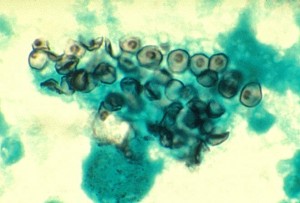Pneumocystis jirovecii causes Pneumocystis pneumonia (PCP) infections with an estimated 200,000-400,000 cases worldwide annually. The disease particularly affects patients with HIV/AIDS, undergoing transplants or with tuberculosis.
The current gold standard for PCP diagnostics requires either bronchoscopy or induced sputum, both of which carry potentially serious medical consequences as the procedure involves the use of bronchodilators. Prompt diagnosis is essential for a good prognosis, and whilst the Western world has mortality rates of around 80-90% with potentially rapid diagnosis, this is not reflected in poorer nations.
A recent study by Nowaseb and colleagues from the Allergy Clinical Research Facility, at the University of Manchester, reaffirmed previous findings by Choe et al (2014) that expectorated sputum, coughed up without induction, can provide a comparable quality of sputum for diagnostic tests such as quantitative PCR and GMS staining.
These studies question the need for using induced sputum which is relatively expensive to obtain and carries more risks; since expectorated sputum was effective for routine diagnosis and the sample can be collected anywhere—even outdoors.
Choe et al 2014, Nowaseb et al 2014
